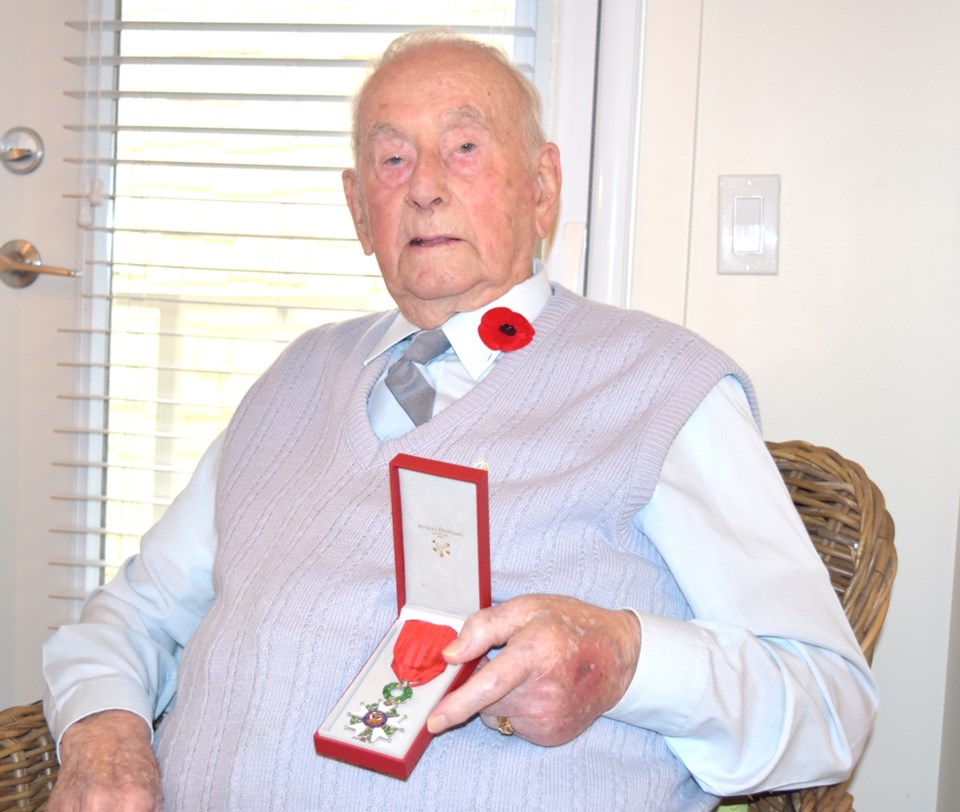It’s going to be quite a birthday celebration on Dec. 13 for Steveston’s Len Rigg.
“I never thought I’d make it,” says the D-Day veteran, who will not only mark a century of living, but be recognized by the French government with its Legion of Honour medal that was established in 1802 by Napoleon Bonaparte and is the highest decoration bestowed in France.
Scheduled to make the official presentation is the French Ambassador to Canada, Nicolas Chapuis.
“It was for fighting on French soil,” Rigg said. “I was surprised when it came because I never expected anything from France.
“Now, I’m not sure where it should go on my jacket, separate, or with the rest of my medals,” he said with a wry smile. “Wherever, it’s quite the honour.”
Rigg’s daughter, Eileen Campbell, said she first became aware of the availability of the medal two years ago when a group of local veterans were invited to a ceremony in Downtown Vancouver where both the French and Dutch governments bestowed their thanks and medals on vets who helped liberate their countries.
Knowing that her father also qualified for the honour, she gathered all the required paperwork and applied for the medal.
According to the declaration that came with Rigg’s award, it attests to the recipient’s courage and devotion and the ideals of liberty and peace.
“This distinction illustrates the profound gratitude that France would like to express to you,” it states. “It is awarded in recognition of your personal involvement in the liberation of our country during World War II. Through you, France remembers the sacrifice of all of your compatriots who came to liberate French soil.”
While the recognition is arriving about a lifetime after D-Day, the significance of the medal for Rigg remains, as does the memories of how he earned it.
He was not yet 28 when he was packed into a train car along with the rest of his group in the British Army’s Corps of Royal Engineers and shuttled to the seaside town of Newhaven, just west of Eastbourne on the southern coast of England.
The train stopped about 15 yards from a small armada of troop-carrying landing craft at the wharf that would ferry Rigg and his fellow soldiers across the English Channel.
“They had locked the rear door of the train, so there was only one way out and that was towards the boats. There was no escape,” he laughs.
Prior to boarding the boats, each of the soldiers was given a shoebox-sized, cardboard container that was filled with rations designed to last 24 hours. Among the items inside was a special tin of Campbell’s Soup.
“You’d never believe this, and I’ve never seen it since. But in the middle of the tin was a candle. You lit it, and by the time it burned down to the bottom it was ready to eat,” Rigg says, adding it didn’t make the soup too hot, but enough to make it palatable.
“I thought it was a great idea and that after the war you’d see that everywhere,” he says. “But I never saw another one.”
Crossing the English Channel was incident-free as the waters were relatively calm. But when they landed on the beaches of Arromanches-les-Bains, Normandy, the full fury of war was unleashed on them.
“The first guy I saw get killed just before we got off the boat was a dispatch rider (messenger) on a motorbike,” he said. “He was riding across the sand on the beach and all of a sudden he went straight up in the air, both him and the bike.
“He had hit a mine.”
Rigg knew a thing or two about the dangers of mines. Originally, he was assigned to a Bailey (pontoon) bridge unit. But once he had finished his training, he became ill and was in hospital for two weeks. When he emerged, he was sent to another unit as a mine-layer and clearer. That was to be his task on D-Day.
“When I discovered that, I thought to myself, what have I done now,” he said. “On my way over on the boat, I thought to myself that I’ll never see England again.”
But Rigg did. He survived D-Day and was among the Allied Forces to take part in a victory parade in Berlin, once the war had ended. “All the big shots were there,” he said, “Stalin, Churchill and Montgomery.”



